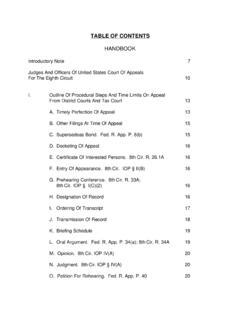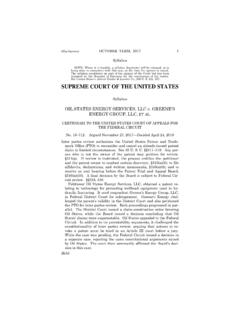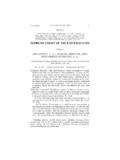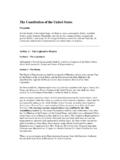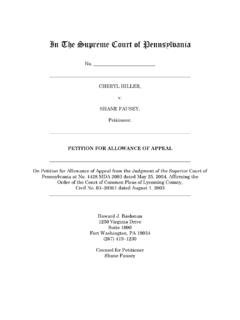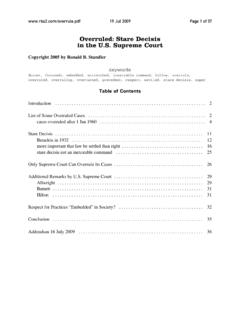Transcription of UNITED STATES SUPREME COURT REVIEW …
1 UNITED STATES SUPREME COURT . REVIEW - preview - overview . CRIMINAL CASES GRANTED REVIEW AND DECIDED. DURING THE OCTOBER 2017-18 TERMS. THRU JUNE 28, 2018. PAUL M. RASHKIND. CHIEF, APPELLATE DIVISION. OFFICE OF THE FEDERAL PUBLIC DEFENDER, FLA. I. SEARCH & SEIZURE. A. Historical Cell Phone Location Data. Carpenter v. UNITED STATES , 138 S. Ct. ___ (June 22, 2018). In this case, as in thousands of cases each year, the government sought and obtained the historical cell phone location data of a private individual pursuant to a disclosure order under the Stored Communications Act (SCA) rather than by securing a warrant. The historical data revealed the location and movements of Carpenter, a cell phone user, over the course of 127. days, and was used to prove his location in the vicinity at the time of multiple armed robberies.
2 Under the SCA, a disclosure order does not require a finding of probable cause. Instead, the SCA authorizes the issuance of a disclosure order whenever the government offers specific and articulable facts showing that there are reasonable grounds to believe that the records sought are relevant and material to an ongoing criminal investigation. 18 2703(d). As a result, the district COURT never made a probable cause finding before ordering Carpenter's service provider to disclose months' worth of his cell phone location records. A divided panel of the Sixth Circuit held that there is no reasonable expectation of privacy in these location records, relying in large part on four-decade-old decisions of the SUPREME COURT . Those decisions form what is known as the third-party doctrine, which exempts from the Fourth Amendment warrant clause records or information that someone voluntarily shares with someone or something else here, the phone companies from which the records were obtained.
3 The SUPREME COURT reversed, in a 5-4 decision authored by Chief Justice Roberts, holding that obtaining such historical cell site records was a Fourth Amendment search requiring a search warrant. The majority opinion holds that because of the unique nature of cellphone location information, the third party doctrine did not apply. The majority focused on the nature of the information at issue and the seismic shifts in digital technology, to justify carving out such records from the third party doctrine. The third party doctrine was left intact as it originally applied to a telephone number and bank Prepared by Paul M. Rashkind 1. records, but was made inapplicable to cellphone location information. It should be noted that the opinion confines its holding to historical information of a week or more, and it specifically exempts the acquisition of information in an emergency setting, distinguishing current location information used to stop an ongoing crime, from historical information gathered to prosecute a completed crime.
4 The four dissenting justices (Kennedy, Thomas, Alito & Gorsuch) wrote separate opinions, although sometimes interlocking. B. Government Subpoena of Email Records Held Abroad. UNITED STATES v. Microsoft, 138 S. Ct. ___ (dismissed as moot Apr. 17, 2018). In December 2013, federal law enforcement agents obtained from the UNITED STATES District COURT for the Southern District of New York a warrant under 2703 of the Stored Communications Act requiring Microsoft to disclose all e-mails and other information associated with the account of one of its customers, who was suspected of drug crimes. The warrant directed Microsoft to disclose to the government the contents of a specified e-mail account and all other records or information associated with the account [t]o the extent that the information.
5 Is within [Microsoft's] possession, custody, or control.. Microsoft determined that the account's e-mail contents were stored in a sole location: Microsoft's datacenter in Dublin, Ireland. Microsoft moved to quash the warrant with respect to the information stored in Ireland. A magistrate judge and later a district judge denied Microsoft's motion. Acting on a stipulation submitted jointly by the parties, the district COURT held Microsoft in civil contempt for refusing to comply fully with the warrant. On appeal, the Second Circuit reversed the denial of the motion to quash and vacated the civil contempt finding, holding that requiring Microsoft to disclose the electronic communications in question would be an unauthorized extraterritorial application of 2703. The SUPREME COURT granted certiorari to decide whether, when the government has obtained a warrant under 18 2703, a provider of e-mail services must disclose to the government electronic communications within its control even if the provider stores the communications abroad.
6 While the case was pending, on March 23, 2018, Congress enacted the Clarifying Lawful Overseas Use of Data Act (CLOUD Act), which added a provision requiring production under such a subpoena regardless of whether such communication, record, or other information is located within or outside of the UNITED STATES . Soon after, the government obtained, pursuant to the new law, a new 2703. warrant covering the information requested in the 2703 warrant at issue in this case. Both Microsoft and the government conceded that the newly-issued subpoena moots the present case. The SUPREME COURT Prepared by Paul M. Rashkind 2. then dismissed this case as moot in a per curiam opinion, ordering the customary vacatur of the decision below. C. Suppression of Title III Wiretaps. Dahda v.
7 UNITED STATES , 138 S. Ct. ___ (May 14, 2018). Title III of the Omnibus Crime Control and Safe Streets Act of 1968 authorizes a judge to issue a wiretap order to intercept communications within the COURT 's territorial jurisdiction and provides for suppression of communications intercepted pursuant to a facially insufficient order. Roosevelt Dahda and his brother Los Dahda (and 41 others) faced criminal charges involving the operation of a marijuana-distribution network centered in Kansas and extending to California. Much of the evidence introduced against them was obtained through wiretaps of cell phones used by Dahda and others. The wiretaps took place during the six months preceding the Dahdas'. arrests and had been authorized by the District COURT for the District of Kansas.
8 Petitioners moved to suppress the wiretap evidence at their criminal trial arguing that the evidence was obtained pursuant to a series of facially insufficient wiretap orders that authorized interception of communications outside of the issuing COURT 's territorial jurisdiction. The district COURT denied their motion to suppress the evidence and they were convicted. The Tenth Circuit concluded in their separate appeals that suppression was not warranted even though the orders had been facially deficient. The COURT of appeals agreed that the orders were extraterritorial and thus facially insufficient. But the COURT interpreted 18 2518(10)(a)(ii) which provides for suppression of an intercepted communication if the authorizing order was insufficient on its face to include an additional, unwritten requirement that, for suppression to occur, the facial insufficiency must result from a statutory violation that implicates a core concern.
9 Underlying Title III. The COURT of appeals determined that Title III's territorial-jurisdiction limitation did not implicate a core concern of Congress in enacting the statute, and thus held that evidence obtained pursuant to the facially insufficient orders should not be suppressed. The SUPREME COURT affirmed (8-0) on different grounds in an opinion delivered by Justice Breyer. Initially, the COURT rejected the Tenth Circuit's application of the core concerns test to subsection (ii). Like the Dahdas, we believe that the Tenth Circuit's interpretation of this provision is too narrow. The Tenth Circuit took the test it applied from this COURT 's decision in UNITED STATES v. Giordano, .. [b]ut Giordano involved a different provision. The statute sets forth three grounds for suppression: (i) the communication was unlawfully intercepted.
10 (ii) the order of .. approval under which it was intercepted is insufficient on its face; or Prepared by Paul M. Rashkind 3. (iii) the interception was not made in conformity with the order of authorization or approval. 2518(10)(a). Giordano focused not, as here, on the second subpara- graph but on the first subparagraph, which calls for the suppression of unlawfully intercepted' communications. In Giordano, the COURT held that the first subparagraph did cover certain statutory violations, such as those provisions that implemented the wiretap-related congressional concerns the Tenth Circuit mentioned in its opinion. So construed, the suppression provision left room for the second and third subparagraphs to have separate legal force. The COURT went on to hold that a violation of the approval-by-the-Attorney-General provision implicated Congress' core concerns.
